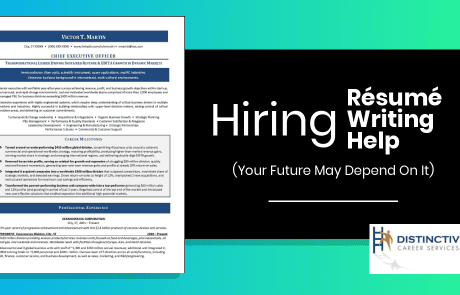
If you have had any exposure to sales or marketing, you know that creating a unique value proposition is a foundational part of every marketing campaign. Likewise, defining a resume value proposition is a vital aspect of your personal marketing campaign as you pursue your dream job.
When it comes to your job search, your resume is often the first introduction to a hiring manager that you have – and, of course, as you have undoubtedly heard many times, first impressions are key.
Resumes are scanned for mere seconds.
The initial review is nothing more than a process to filter out unqualified candidates.
You only have a few seconds to catch a hiring manager’s attention and entice them to read further. That’s where your unique value proposition comes into play. Incorporating a personal value proposition very clearly and concisely into your resume is the key to ensuring your resume stands out from the rest.
What Exactly Is a Resume Value Proposition?
Remember that the first and primary goal of your resume is to land you an interview.
Now, imagine the prospective employer quickly scanning through resume after resume. It is only if something literally “pops” out at the employer – something that directly relates to a need or a problem that the hiring manager hopes to solve – that the resume will be shortlisted for an interview.
You must find a way to make your resume grab the recipient’s immediate attention – and then, once you have that attention, pique it and compel the recipient to pick up the phone and call you for an interview. Your unique value proposition is a key way to achieve it.
So, what is a resume value proposition? At its core, it’s a statement that outlines your value in the workplace and the return on investment that an employer can expect from hiring you. It is a statement that clearly conveys what makes your contribution special and what differentiates you from your peers.
Another way to think of a value proposition is as a brief summary of your personal brand. What sets you apart from other candidates? What key skills and experiences do you bring to the table?
By answering these questions clearly and concisely, you’re giving potential employers a reason to take a closer look at your resume.
Examples of Strong Value Proposition Statements
One of the key components of a successful resume is a strong summary that captures the attention of potential employers. When it comes to crafting a strong resume professional summary, one key element stands out above the rest: your personal value proposition statement.
This statement is the essence of who you are, what you offer, and what sets you apart from other candidates. To make this value proposition statement ‘pop’ on your resume, many professional resume writers will call it out right at the top of your summary.
Here are some examples of resume summaries from resumes written by Distinctive Career Services’ professional resume writing team. Each summary is led by a strong personal value proposition.
Example Resume Value Proposition #1
What makes this first value proposition example an excellent one?
The moment you view this resume, you know that this product management director is distinguished as an “Award-winning, internationally savvy, trilingual senior leader with demonstrated ability to execute successful product vision and strategy.”
This is her primary value offering, backed by bullet points highlighting specific achievements and tangible results for past employers.
Example Resume Value Proposition #2
In this second example of a general manager resume, the personal value proposition makes a promise that is especially valuable in the business world: “Galvanizing Business Success Through Bold, Visionary Leadership and Relentless Pursuit of Aggressive Goals.”
While there are personality traits and unique strengths called out, the bullet points provide concrete evidence of future potential illustrated through past accomplishments and quantified results that demonstrate the value added by the job seeker.
Example Resume Value Proposition #3
This third example value proposition from the resume of an analyst, “Equip executive teams with data-led insights that impact strategy, growth, and profitability,” shows another format for a resume summary: paragraphs rather than bullet points. If your paragraph is more than five lines long, it is a resume writing best practice to break it into a few paragraphs. This helps keep the resume easy to read.
As you can see, by including this statement in your summary, you effectively tell employers what sets you apart from other candidates and why they should consider you for the position.
But don’t stop with the summary section. Look throughout the body of your resume and the chronology of your work experience. Do your job descriptions and achievements support your unique value proposition? Can you rephrase or reframe your descriptions and achievements so that they serve as illustrative examples of your value proposition?
Also, remember that it’s important to customize your resume to each specific job application, highlighting the skills and experiences that are most relevant to that particular role. Sometimes, it might make sense to tailor your value proposition for the job opportunity, too. By using a targeted resume, you increase your chances of catching the hiring manager’s eye and landing the interview.
Creating Your Personal Value Proposition
Make no mistake about it. When an employer hires you, they are making an investment in you. And they are doing so with the expectation of receiving value in return – usually with the expectation that you will:
- save them money
- make them money, or
- save them time
Understanding this reality is crucial if you are serious about achieving real success in your job search.
In your resume, and really – throughout the application process and your job search – you need to make it a priority to communicate what it is that sets you apart. You need to make it clear that you understand the employers’ needs, problems, and priorities – and then you need to show how you are the answer to their problems.
Writing your resume in the CAR format, along with recognizing and conveying your resume value proposition – essentially establishing yourself as a valuable commodity in the workplace – is really the cornerstone and foundation of all truly effective resumes.
So, I encourage you to spend some time identifying your unique value proposition as it relates to your career. Begin by identifying your target audience, research the company, and understand the job description. Then, consider how your skills, experience, and accomplishments align with the target position and the company’s goals, mission, and values.
5 Tips for Identifying Your Personal Value Proposition
- 1
Self-Reflection: Take a step back and think about your career journey. What patterns emerge? Are there specific challenges you’ve consistently overcome or particular strengths you’ve leveraged?
- 2
Feedback from Others: Sometimes, others see our value more clearly than we do. Ask colleagues, mentors, or supervisors about the unique value you bring to the employment table.
- 3
Analyze Past Evaluations: Review any job performance evaluations or feedback you’ve received. These often highlight areas where you excel.
- 4
SWOT Analysis: Conduct a personal SWOT analysis (Strengths, Weaknesses, Opportunities, Threats). This can help you identify what you offer that others might not.
- 5
Value Beyond the Job Description: Think about the unofficial roles you’ve taken on in past positions. Have you often been the team mediator, the tech troubleshooter, or the go-to person for client relations?

15 Questions to Ask Yourself
- 1What problems am I particularly good at solving?
- 2In what ways do I have the ability to make my employers money or save them money?
- 3Do I stand out in my ability to increase efficiency or productivity?
- 4What value can I bring to the company that other candidates cannot?
- 5What is the “legacy” of value I have left at past employing companies?
- 6What are my top three professional achievements, and what skills or qualities did I use to achieve them?
- 7Have I ever improved a process, system, or approach at work? What was the impact?
- 8What tasks or projects energize me the most, and why?
- 9How have I adapted to changes or challenges in my previous roles, and what did I learn from those experiences?
- 10What feedback do I consistently receive from peers, supervisors, or subordinates about my work or approach?
- 11In what areas do I consistently outperform my peers or exceed expectations?
- 12What unique perspectives or experiences do I bring to my profession or industry?
- 13How do I handle setbacks or failures, and what do they teach me?
- 14What additional responsibilities have I taken on outside of my official job description, and why?
- 15If I were to ask my colleagues to describe me in three words, what would they say?
Incorporating Your Value Proposition Across Career Communications
Your value proposition isn’t just for your resume—it should permeate every aspect of your professional branding. By consistently showcasing your unique value across various career communications, you create a cohesive and compelling narrative about your professional identity. Here’s how to weave your value proposition into different platforms:
- Your Cover Letter:
- Introduction: Start your cover letter by briefly introducing your value proposition. This sets the tone and immediately grabs the hiring manager’s attention.
- Body: Use the main body of the cover letter to provide specific examples that support your value proposition. These examples should be relevant to the job you’re applying for and demonstrate how you’ve added value in past roles.
- Conclusion: Reiterate your value proposition and express how it aligns with the company’s goals or mission. This reinforces your fit for the role and leaves a lasting impression.
- LinkedIn Profile:
- Headline: Your LinkedIn profile headline is prime real estate. Craft a concise version of your personal value proposition to immediately convey your unique value to anyone viewing your profile.
- Summary: The LinkedIn summary section allows for a more in-depth exploration. Here, expand on your personal value proposition, providing context and perhaps a brief story or example that illustrates it.
- Recommendations: Encourage colleagues or supervisors to write LinkedIn recommendations that highlight experiences or achievements that support your value proposition.
- Networking and Interviews:
- Elevator Pitch: When networking or in interviews, you’ll often be asked, “Tell me about yourself,” (aka an elevator pitch) This is your cue to present a succinct version of your personal value proposition, tailored to the context.
- Follow-up Emails: After a job interview or networking event, reinforce your personal value proposition in your thank-you letter or follow-up emails.
- Other Career Communications:
- Business Cards: If you have a personal networking business card, consider including a shortened version of your value proposition as a tagline.
- Email Signature: Add a concise version of your value proposition below your name in your professional email signature. This ensures that every email you send reinforces your professional brand.
By consistently integrating your personal value proposition across all career communications, you ensure it is front and center, regardless of the platform or medium. This not only strengthens your professional brand but also reinforces your value to potential employers, clients, or collaborators.
The Power of a Strong Resume Value Proposition
Crafting a unique value proposition is not just a fundamental part of an effective resume; it’s the essence of your professional identity. This statement encapsulates your value in the workplace, showcasing the return on investment an employer can anticipate from hiring you.
By integrating this proposition into your resume, you not only set yourself apart from the myriad of other candidates but also capture the employer’s immediate attention. It’s more than just a summary of your skills and experiences; it’s a testament to what makes you distinct and the tangible benefits you bring to the table. Tailoring your value proposition to the specific role you’re eyeing ensures its relevance and potency.
So, if you’re genuinely committed to securing a job that aligns with your aspirations, emphasize your unique value proposition. By recognizing and articulating the value you offer—whether it’s saving money, generating revenue, or enhancing efficiency—you pave the way to not just any job, but your dream job.
Remember: there is no need to struggle to write your own resume. Hiring resume experts such as the Distinctive Career Services team is almost always an investment that pays huge returns. Reach out to learn more about our professional resume writing services and to get a personalized quote.
Updated and republished for 2024 and beyond from an article originally published on this blog on March 9, 2011.













